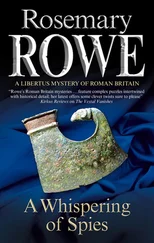Rosemary Rowe - Requiem for a Slave
Здесь есть возможность читать онлайн «Rosemary Rowe - Requiem for a Slave» весь текст электронной книги совершенно бесплатно (целиком полную версию без сокращений). В некоторых случаях можно слушать аудио, скачать через торрент в формате fb2 и присутствует краткое содержание. Жанр: Исторический детектив, на английском языке. Описание произведения, (предисловие) а так же отзывы посетителей доступны на портале библиотеки ЛибКат.
- Название:Requiem for a Slave
- Автор:
- Жанр:
- Год:неизвестен
- ISBN:нет данных
- Рейтинг книги:4 / 5. Голосов: 1
-
Избранное:Добавить в избранное
- Отзывы:
-
Ваша оценка:
- 80
- 1
- 2
- 3
- 4
- 5
Requiem for a Slave: краткое содержание, описание и аннотация
Предлагаем к чтению аннотацию, описание, краткое содержание или предисловие (зависит от того, что написал сам автор книги «Requiem for a Slave»). Если вы не нашли необходимую информацию о книге — напишите в комментариях, мы постараемся отыскать её.
Requiem for a Slave — читать онлайн бесплатно полную книгу (весь текст) целиком
Ниже представлен текст книги, разбитый по страницам. Система сохранения места последней прочитанной страницы, позволяет с удобством читать онлайн бесплатно книгу «Requiem for a Slave», без необходимости каждый раз заново искать на чём Вы остановились. Поставьте закладку, и сможете в любой момент перейти на страницу, на которой закончили чтение.
Интервал:
Закладка:
He led the way into the inner court and up the staircase to where the commander’s private office was. When we were summoned in answer to our knock, the optio pushed me in ahead of him, then stood stiffly to attention in the middle of the room. There was a smell of armour polish, lamp fat, sweat and grease.
‘In the name of his Imperial Divinity. .’ the optio began.
The commander waved these formalities aside. ‘Oh, very well! Forget the formula.’ He pushed away the pile of documents before him on the desk and leaned back on his stool. These — apart from a handsome oil lamp on a stand and the shadowy statue of a deity in a niche — were the only furnishings in this spare and spartan room. ‘What is it that you want?’
‘A prisoner requesting an audience with you, sir. Brought here on a charge, but has information on that dead slave in the woods.’
The grizzled eyebrows rose an inch or two, and the commander turned a pair of weary eyes on me, but when he saw me his manner changed at once. ‘Citizen Libertus, you are here again?’ He sounded at once exasperated and amused. ‘Why is it that every time I find a corpse you are not far behind? Never mind. If you have information, I’ll be glad to hear. Optio, you may leave us.’
The soldier snapped his sandal-heels together in salute and clattered off downstairs.
‘Now, what is it?’ The commander turned to me. He was a lively, weather-beaten man, with a stern though kindly face, who took his position of command more seriously than most — he had declined a position in the senate house at Rome in favour of continuing his military career. ‘I understand that you’re a prisoner in my custody? Do you deserve it?’
‘Only for tying my toga-ends around my waist,’ I said. ‘And for discovering the truth about the chief decurion, which, incidentally, is related to that slave-boy’s corpse you found. I think you’d better hear it. If I’m correct, my patron is in danger of his life — and so am I, of course. And there may even be danger to the state.’
He leaned forward, making a spear-point of his hands. ‘Then tell me all about it — from the beginning, please.’
I told him the whole story: the fruitless visit to Pedronius’s house, the discovery of the pie-seller’s body, and how Virilis had mysteriously known the details of the face, when no one but myself and Radixrapum were supposed to have seen the corpse.
‘What about the soldiers who brought the army cart? Could one of them have told him?’ the commander asked. He was scribbling down details on a piece of wax, though he’d nearly filled the writing-block by now.
I shook my head. ‘We’d bandaged up the face. It was not visible,’ I said.
He nodded and poised his pointed stylus once again. ‘Go on.’
I went on: all about Glypto, and the message that brought my wife to town, and the appearance of Virilis at the naming day. ‘He must have been astonished to find me there,’ I said. ‘When he killed Radixrapum just the night before, he thought that he had strangled me .’
‘So both of the murders took place yesterday, and you think he moved the turnip-seller to your workshop after dark? Which means that he rode to Marcus’s villa very late indeed — though he was an expert rider, I suppose. Yet he had already been there earlier in the day, I think you said.’
‘In the morning, after he had visited the curia,’ I said. ‘And that’s another intriguing thing. Of course, the forenoon is when the council generally meets — unless it is some special session like today — but how could a messenger, riding from the west, have contrived to arrive there yesterday so early in the day, deliver a message, wait for a reply and still have time to get to the villa before noon? Even Corinium is at least two hours away, even on horseback, at this time of year.’
The commander gazed at me. ‘Meaning that he had probably spent the night nearby?’
‘I’m almost sure of it. It may have been an inn — I don’t suppose that Quintus would ask him to the house, but I expect the two made contact that evening all the same.’
‘We’ll make enquiries of all the establishments nearby.’ He scratched another sentence on his writing-block. ‘If they were seen together, that will prove you’re right. And you don’t believe the message that the cursor brought — naming Gaius Greybeard as his nominee?’
I looked at him a moment. ‘You know Marcus. What do you suppose?’
He made a wry face. ‘I was doubtful too, but eventually I concluded — as I’m sure many people did — that Gaius had offered money and Marcus had succumbed, perhaps when the candidate he really favoured refused to stand. I have seen it happen many times before.’
‘But not involving Marcus,’ I said indignantly. ‘He is sometimes foolish, but he never takes a bribe. Not over anything important anyhow.’
The sharp eyes twinkled. ‘I won’t tell him you said that. Now, about this murdered turnip-man. .’
I went on with the story, and he made notes of it, occasionally pausing to ask me to expand. When I had finished, he leaned back on his stool and folded his arms across his armoured chest.
‘So, in summary, you think that Quintus tried to have you killed because he’d falsified your patron’s message to the curia — presumably in return for a considerable bribe — and he thought you’d find him out? You have a high opinion of your talents, it appears.’
‘It isn’t my opinion that is relevant,’ I said, feeling a little snubbed by this remark. ‘If Gaius feared me, that might be enough. Perhaps he thought that I would write and tell my patron too, since it is no secret that I send to him each moon with news of what is happening in the town.’
‘Such as the unexpected death of that town councillor?’ The commander grinned at me. ‘I know that your patron found that very interesting. He wrote to me about it under seal. It was inconvenient, he said, having a sudden vacancy when he wasn’t here himself, and he intended to propose a trustworthy candidate.’
‘Inconvenient is not a word I’d choose. I wondered if it was a little too convenient.’
‘So did he, Libertus. That’s why he decided to come home so suddenly. But, returning to your patron’s nominee, it had to be someone with sufficient property, of course, and he told me he would need me to look into that before the voting day.’
‘So he didn’t nominate a candidate at all? Because he didn’t know if the man he had in mind owned enough to qualify?’
The old soldier got slowly to his feet. ‘Oh, he had decided on a nominee all right. He told me who it was. Can you really not guess whom he intended to propose?’
I shook my head. ‘It would have to be someone who’d agreed to it. I suppose that one could make enquiries and find out who it was he had approached. There are not so many people who would qualify.’ I broke off suddenly. ‘It wasn’t Pedronius by any chance?’
‘It was not Pedronius.’ He was smiling now. ‘The man that your patron had in mind is a troublesome old fellow, though he’s bright enough and honest in a dogged kind of way. A pavement-maker who has a workshop on the northern edge of town. .’
I was gaping at him. ‘Me! But he never mentioned it! And I don’t have a property within the walls at all.’
‘That was the reason he consulted me. However, the councillor who died possessed a large estate, including several properties in town. He had no family, so everything went automatically to the residual heirs — Quintus, as you know, received the country house. Your patron got a town apartment as his share. He wanted me to go and look at it, to see if it was big enough to meet the regulations. If so, he was intending to make a gift of it, on condition that you kept it up and left it to his son.’
Читать дальшеИнтервал:
Закладка:
Похожие книги на «Requiem for a Slave»
Представляем Вашему вниманию похожие книги на «Requiem for a Slave» списком для выбора. Мы отобрали схожую по названию и смыслу литературу в надежде предоставить читателям больше вариантов отыскать новые, интересные, ещё непрочитанные произведения.
Обсуждение, отзывы о книге «Requiem for a Slave» и просто собственные мнения читателей. Оставьте ваши комментарии, напишите, что Вы думаете о произведении, его смысле или главных героях. Укажите что конкретно понравилось, а что нет, и почему Вы так считаете.












